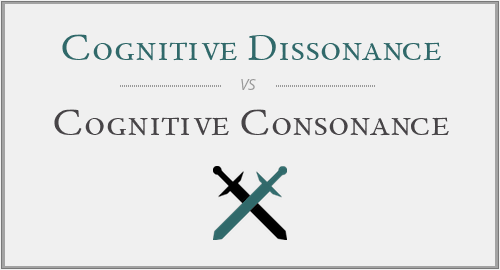
Cognitive Dissonance and Cognitive Consonance are the opposite of each other, but they certainly live side by side: if you pay attention to your mental state, you might discover that you are feeling either one or the other.
• How do you deal with the feeling of Cognitive Dissonance?
• Can you use Cognitive Dissonance as an impetus for self-awareness and self-discovery?
• Do you seek Cognitive Consonance by constructive or destructive avenues?
Continue reading to define the terms “Cognitive Dissonance” and “Cognitive Consonance,” and learn how these two mental states can lead us to higher levels of inner equilibrium.
What is Cognitive Dissonance?
The word “cognitive” (adjective) means relating to the conscious intellectual workings of the mind. The word “dissonance” (noun) means a lack of harmony or consistency.
Cognitive dissonance refers the inner feeling of discomfort that is present when our thoughts, our ideas, or our beliefs are inconsistent with the way that we behave.
This concept was first coined by Leon Festinger, a psychologist, who in 1957 published a book called, “A Theory of Cognitive Dissonance.”
Examples of cognitive dissonance include:
• Valuing honesty but lying to a friend.
• Understanding the dangers of smoking but smoking every day.
• Believing in the rights of women but paying them less salary than their male counterparts.
What is Cognitive Consonance?
Cognitive consonance is the opposite of cognitive dissonance.
The word “cognitive” (adjective) means relating to the conscious intellectual workings of the mind. The word "consonance" is a noun that is derived from the Latin consonantia, which means "in agreement."
The phrase cognitive consonance comes from the language of psychology and describes a sense of being in accord, in balance, when our actions and our thoughts are in line with each other and are working harmoniously.
For example, when you say that you love spending time with a certain friend, and you indeed show clear signs of enjoyment when you are together, you are exhibiting cognitive consonance. Your thoughts and your actions are working in harmony.
Achieving Cognitive Consonance
When we feel cognitive dissonance, we try to achieve cognitive consonance instead.
The feeling of cognitive dissonance is uncomfortable. The inner discord that it produces can be insistent and hard to live with when we are naturally drawn toward equilibrium and cognitive consonance.
Although it is counterintuitive, we can choose to view the feeling of cognitive dissonance as a constructive opportunity to examine ourselves, to learn, to grow, and to become more self-aware.
On the other hand, cognitive dissonance can also lead us to less constructive behavior, and we can choose to remain in denial for long periods of time.
Consider the following examples:
• When our thoughts don’t agree with our behavior, we can resolve this discord by either shifting our thinking or changing our behavior.
For example:
A smoker who is feeling cognitive dissonance from the knowledge that smoking is fatal might either stop smoking or convince himself that the medical reports are exaggerated.
A person learns that his high fat diet is endangering his life. He might change his diet, or he might convince himself that he doesn’t eat much high fat food, after all.
• When our core beliefs are challenged by new information, we might ease the feeling of dissonance by researching the new information, asking questions and learning, or we might simply discredit the new information or look for information which supports what we want to believe.
For example:
If we learn that our favorite senator has done something immoral or not in keeping with our belief system, we can either reevaluate our support of this politician or find a justification for this person’s behavior.
• When what we say is not what we feel, we can find ourselves out of balance, both physically and mentally.
For example:
We might tell our friends that we enjoy our job, but in reality, we are not happy at work. This discrepancy provokes a feeling of cognitive dissonance. We might ease this feeling by examining our real feelings about work, maybe discussing our options with a trusted friend, maybe making some sort of change. Or, we might continue to say the opposite of what we feel.
• When we find ourselves acting in an inauthentic way during a social situation; that is, when our desire to be accepted causes us to act as though the group’s values are more important than our own, the feeling of cognitive dissonance produced might motivate us to stand strong behind what we believe, or we might continue our inauthentic behavior, shifting our values to support the accepted values of the group.
Which is better? Cognitive Dissonance or Cognitive Consonance
At first glance, cognitive consonance is a more positive feeling, both physically and mentally.
However, it could be that cognitive dissonance is more productive in the long run.
Because it is harder to ignore, that uncomfortable sensation of cognitive dissonance may be an enormous motivator, pushing us toward change and ultimately, toward inner harmony.
It is our opportunity to ensure that our behavior reflects the person that we really want to be.








Have a discussion about this article with the community:
Report Comment
We're doing our best to make sure our content is useful, accurate and safe.
If by any chance you spot an inappropriate comment while navigating through our website please use this form to let us know, and we'll take care of it shortly.
Attachment
You need to be logged in to favorite.
Log In